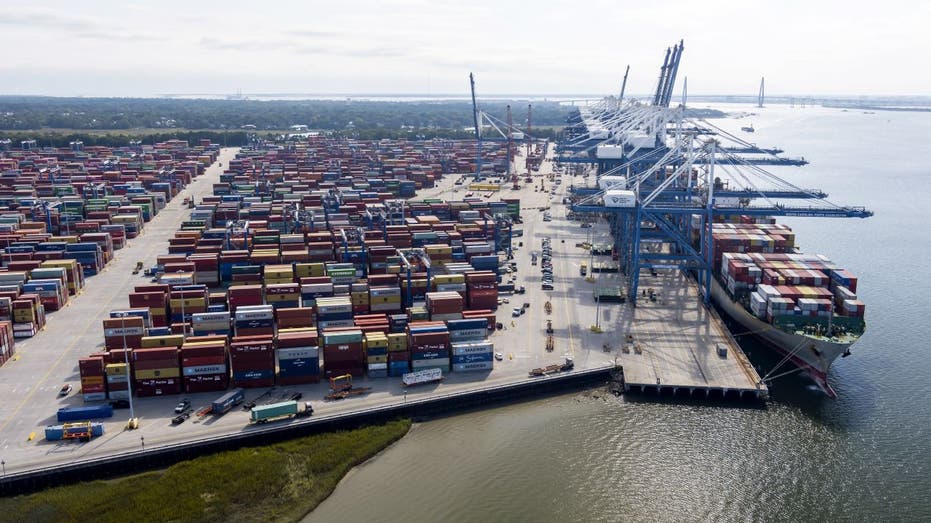Our economy will be 'seriously affected' if there's a port strike: Peter Kopke, Sr.
Produce importer Peter Kopke, Sr. discusses the impact of a looming port strike on 'The Bottom Line.'
In less than a week, dockworkers at ports on the East and Gulf coasts have pledged to strike unless a new contract is reached.
A work stoppage could severely disrupt the U.S. economy, and the dockworkers, represented by the International Longshoremen's Association (ILA), and port employers, represented by the U.S. Maritime Alliance (USMX), remain at an impasse over wages in a new contract.
The ILA is negotiating on behalf of 45,000 dockworkers at three dozen U.S. ports from Maine to Texas that collectively handle about half of the country's seaborne imports. It warned that its members are prepared to stop working if they don't have a new contract by the Oct. 1 deadline, putting various sectors in a dire situation.
PORT STRIKES COULD HAVE 'DEVASTATING' IMPACT TO ECONOMY, RETAIL TRADE GROUP SAYS
Where both sides stand now:
The USMX said in a recent statement that despite its attempts to engage with the ILA, it has been "unable to schedule a meeting to continue negotiations on a new Master Contract."
The group said it remains prepared to bargain at any time. However, the USMX said in the statement published earlier this week that the ILA doesn't seem interested in negotiating at this time.

The Port of Charleston in Charleston, South Carolina. (Photographer: Sam Wolfe/Bloomberg via Getty Images / Getty Images)
"USMX has received outreach from the Department of Labor, the Federal Mediation & Conciliation Service (FMCS), and other federal agencies and we will keep them up-to-date on the status of negotiations," the alliance said Monday, adding that it "would be open to working with the FMCS, as we have done successfully in the past, but that is only possible if both sides agree to mediation."
Meanwhile, the ILA said in a statement that the USMX is "engaging in a misleading publicity campaign with claims that the International Longshoremen’s Association (ILA) refused to negotiate."
The ILA also said that there is a stalemate because USMX continues to offer dockworkers "an unacceptable wage increase package."
"USMX knows what our bottom line with wages needs to be for our ILA rank-and-file to ratify a new Master Contract Agreement," ILA’s International President Harold Daggett said. He added that USMX calls him "several times each week trying to get the ILA to accept a low-ball wage package."

Staff at an Amazon fulfillment center process orders. (Matt Cardy/Getty Images / Getty Images)
The potential impact
Officials – including the biggest retail trade group in the nation – have pleaded for the Biden administration to get involved given the severity of the situation.
JPMorgan estimated that for each day the ports are shut down, it will take roughly six days to clear the backlog. Analysts pegged the economic impact of a strike to about $5 billion per day, according to a research note published earlier this month.
Even a minor disruption to the supply chain would have a "negative impact and cause delays at a critical time for both retailers and consumers," Jonathan Gold, National Retail Federation (NRF) vice president of supply chain and customs policy, previously told Gxstocks.
This type of disruption in shipping and supply chains often leads to product shortages, which drives up prices.
SalSon Logistics CEO Jason Fisk told Gxstocks that shoppers "should brace for a rise in prices for goods by the first quarter of 2025, or possibly even sooner."
Furthermore, Cody Moore, partner and wealth adviser of wealth management firm Wealth Enhancement & Prevention, told Gxstocks that if there is an uptick in prices, it could push inflation higher and potentially delay the Federal Reserve from cutting rates further.

An AutoNation dealership in Las Vegas, Nevada, on July 18, 2023. (Bridget Bennett/Bloomberg via Getty Images / Getty Images)
Ultimately, a prolonged strike could "impact consumer costs for things like home mortgages, car loans and credit cards," he said.
An extended port strike would also delay the arrival of new car inventory, which would drive up costs for potential buyers. Not only would it be harder and more expensive to buy a car, but the lack of essential parts and materials would hinder maintenance repairs on existing vehicles.
Can the president get involved?
Presidents have the authority to intervene in labor disputes that pose a threat to national security or safety under a law known as the Taft-Hartley Act, which lets the president impose an 80-day cooling-off period under which workers go back to work while negotiations continue.
However, President Biden has signaled that he doesn't plan to intervene in a potential strike, and the White House released a statement that urged both sides to continue negotiations and noted the administration is assessing ways to respond to supply chain disruptions.
Biden has been urged by the National Retail Federation and 177 trade groups representing retailers, manufacturers, farmers, automakers and truckers to facilitate negotiations and step in to prevent disruptions.
Gxstocks' Eric Revell contributed to this report.




